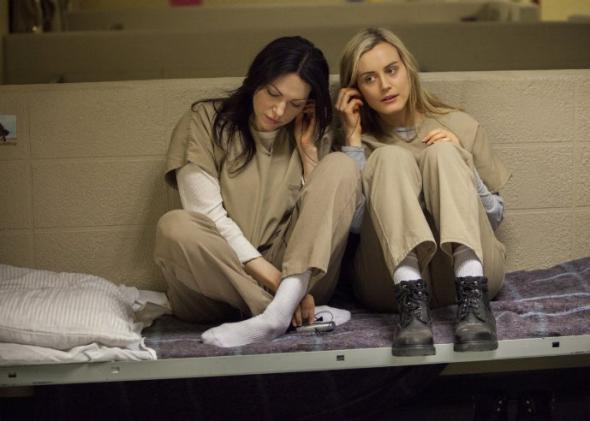This is the third entry in an Outward dialogue. Earlier, Vanessa Vitiello Urquhart celebrated the impending demise of gay culture, and June Thomas wondered why Vitiello Urquhart was so misguided. Later, Thomas bemoans the lack of a queer canon.
June,
You asked if there was anything about gay culture I would miss, and I’m racking my brain to think of something. As a writer who happens to be lesbian, the lesbian novel has always held a particular horror for me, unmatched even by the terrible and cringe-inducing lesbian-themed direct-to-video movie. Can we please stipulate that this tapestry of cultures of which you speak with such fondness was often absolutely awful—and that the best thing to happen to lesbian cinema was the introduction of more mainstream fare with movies like Kissing Jessica Stein or Chasing Amy? Today, Orange Is the New Black is a great example of the way a more open culture allows for offerings with queer characters to be mixed in along with straight ones, all while meeting minimal standards of quality, and for a mixed audience. Call me a snob, but I want more of that, and less of the bad old stuff.
Not only were gay cultural offerings often poorly conceived, badly executed works foisted upon a captive audience with few other options, but as a lesbian with more than two functioning brain cells I’ve often chafed at the expectation of intellectual and political conformity that gay culture imposes on us as a price of entry. God forbid that one suggests, even mildly, that some Republicans might not be all that bad—you’ll face the wrath of self-appointed gatekeepers like Dan Savage for your trouble. So, yes, I suppose I do look forward to the end of all that with just a bit more glee than you might find seemly. But that’s not why you and others like you should join me in hoping that the demise of gay culture comes as speedily as possible.
You mentioned that you came to America from Northern England, June. My own family originated in Italy. My Sicilian grandmother, on my father’s side, left school at the age of 12 to work in a factory, and her husband was a fireman. Their two sons both became lawyers, and her grandchildren, myself included, are pretty indistinguishable from WASPs these days. In my parent’s day, there was still a belief that Catholics couldn’t be trusted to hold high office because of their supposed fealty to the pope. These days, Catholics can be found in all sorts of positions, high and low, throughout both major parties. As an American, my birthright is an assimilationist one.
This process of assimilation—whether we celebrate it or bemoan it—is one that’s happening swiftly for gays and lesbians already. The one thing standing in its path is the persistence of anti-gay bigotry, which I know we’d both love to see the end of. But claiming our birthright in the highly mobile, technologically connected world in which we live doesn’t exactly mean that I imagine gays and lesbians staying home on the ol’ family farm, helping Ma and Pa to bring the crops in. My straight siblings both left Massachusetts for college, never to return. I was the last to leave my home state, and I did so with the knowledge that I’d be facing a less accepting environment than the one that I was leaving. Being able to move freely and fearlessly through my own country should be a minimum requirement for a successful gay rights movement, and I admit, we’re not quite there yet.
I’d like to see us there within my lifetime, though, and my experience in Tennessee thus far has given me reason to believe it’s possible. As an out lesbian, I’m a bit of a novelty here, but despite that, the majority of my interactions with Southerners have been positive ones. I believe that the more exposure they have to out gays and lesbians the better it will get for those who follow us. It will take some work, but I don’t believe there’s anything inherently backward about the South or middle of the country that makes further progress an impossibility.
My hope is that gays and lesbians who are born in 2025 or later will view their sexual orientation as a minor matter of personal difference. It will not dictate which cities they move to or what cultural products they consume. While they’ll certainly be friends with other gays and lesbians, they will not grow up faced with the kind of fear that leads to a craving for being alone with others of their tribe. They will feel no more or less comfortable around straights than they feel around other gays, because they will lack that inner sense of their unique vulnerability or unworthiness that you and I still have to deal with.
So here’s my question for you: With all the changes you’ve seen over your lifetime, why is it so hard to imagine that the generation of my grandkids (or grandnieces and -nephews) could be as far ahead of me in finding a comfortable spot within the dominant culture as my generation is ahead of the generation that rioted at Stonewall? Is there some reason you see this as naive or hopelessly idealistic? Are you secretly rooting against the continued progress of our people?
My mom drinks herbal tea. I hate the stuff.
Vanessa
